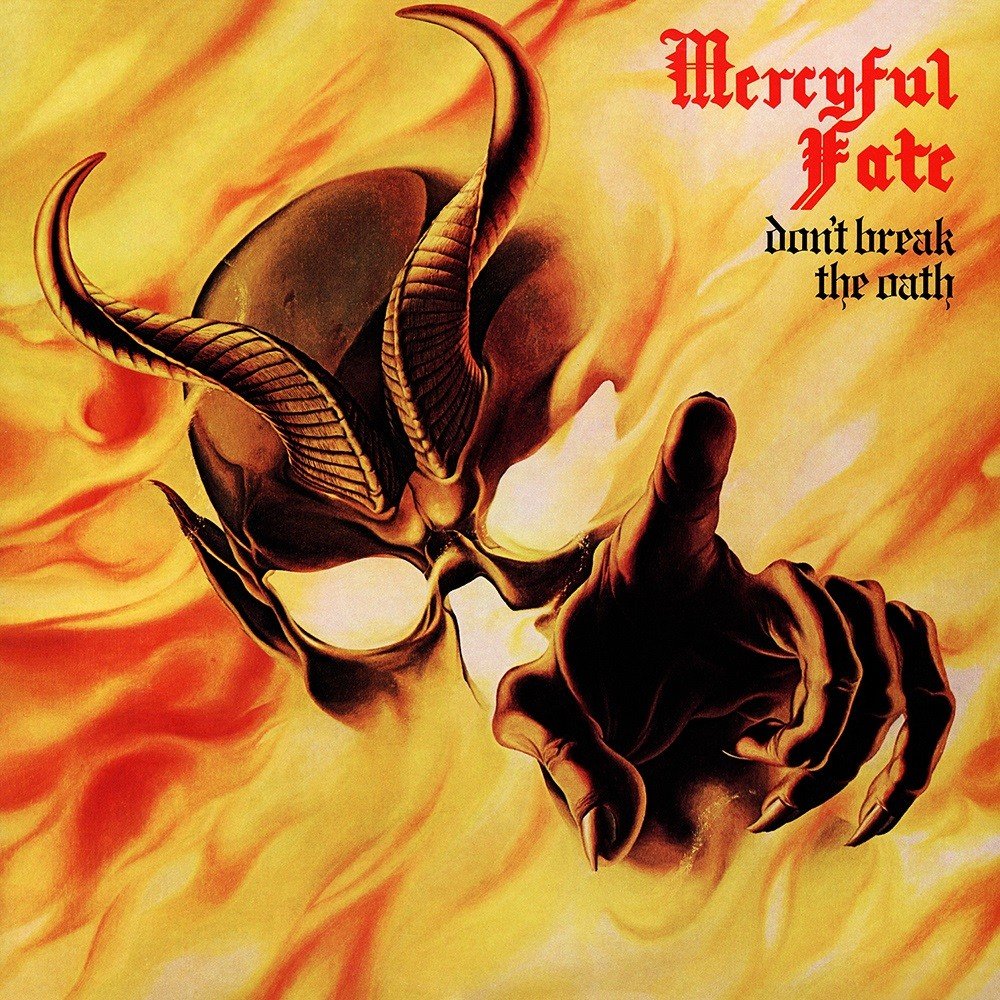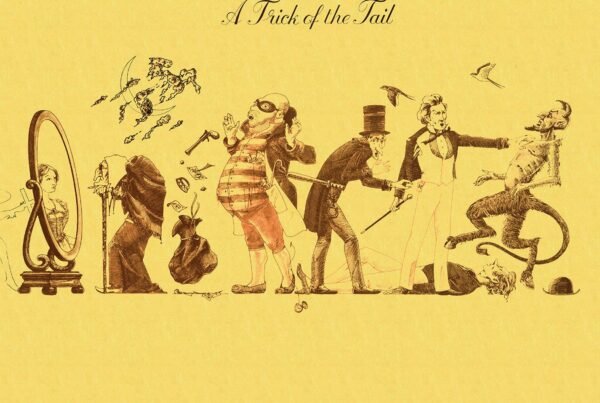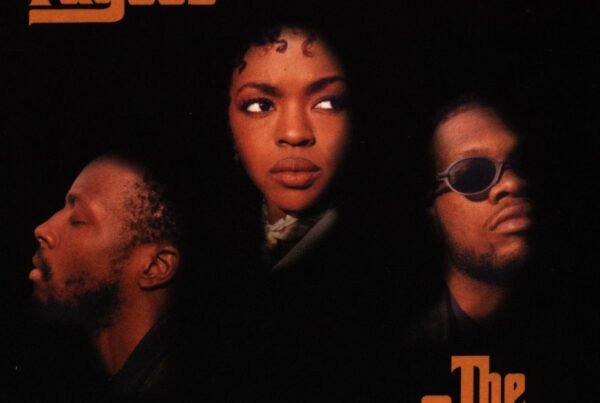Release date: September 7, 1984 | Roadrunner Records | Facebook | Instagram | Twitter | Website
In heavy metal, especially during the genre’s infancy, few people and bands were as genuinely iconic as King Diamond and Mercyful Fate. With an instantly recognisable look and voice at the helm, the Danish outfit became a legendary force of heavy music, inspiring many aspiring musicians to follow in their wake. Black metal’s entire visual aesthetic would be borderline unthinkable without Mercyful Fate and the path they forged.
Today, their sophomore record Don’t Break the Oath turns a whopping 40 years old, so selecting it for a timely A Scene In Retrospect recognition felt like an absolute no-brainer. Fans of traditional heavy metal, up the horns and let’s fucking rock!
Iain Ferguson
The days are getting shorter. The mornings and evenings are growing cooler. Soon enough, the leaves will turn. Autumn is officially on its way, and with it comes those sweet, spooky Halloween vibes! I don’t know about you, but if any one musician sums up Halloween for me, it’s King Diamond, or more specifically his work with Mercyful Fate. The season is upon us, so there’s no better time to dive on Mercyful Fate‘s legendary sophomore album, Don’t Break the Oath.
Before I begin, I’ll own up to it; Melissa is still my favorite album in King Diamond‘s discography (and in traditional heavy metal as a whole). Anything that followed, including Don’t Break the Oath, doesn’t stand quite as strong for me. But one could fairly argue that Don’t Break the Oath is a ‘better’ album, and the band tightened up their approach between albums in an almost universally positive way. Of course, all the key elements are here by way of Michael Denner and Hank Shermann’s pristine twin guitar attack, Timi Hansen’s mighty bass, and Kim Ruzz’ rock solid drumming. And of course, there’s ubiquitous specter of King Diamond and his mighty vocal performance. All the pieces from previous releases are still on full display.
But in other ways, Don’t Break the Oath marks a shift. For starters, some of the rocky grit from the debut has been supplanted by a more progressive and purely heavy metal character. The production standards are more sleek, polished, and professional than its down and dirty predecessor (though it does date the album just a smidge). The songwriting is more diverse and complicated across the board, varying tempos much more often and playing with more ambitious, drawn-out structures. And the album does feel more atmospherically potent, evoking a far more genuinely malevolent character than Melissa, a bit of charming goofiness notwithstanding.
I mean, hell, how strong of an opener is “A Dangerous Meeting”? That searing opening salvo introduces the album’s atmosphere perfectly, and the song coils around with so many great riffs that it’s almost unfair. Add to that King Diamond‘s soaring vocals, and Don’t Break the Oath at least starts out just as powerfully as Melissa. Side A is just a genuine delight front to back. The twisting passages of “Nightmare”, the swaggering groove of “Desecration of Souls”, and that blazing intro in “Night of the Unborn” are all just pristine in construction, offering enough quality metal to rival any other band on the scene in that era.
Side B also carries some of Mercyful Fate‘s greatest moments by way of “The Oath” and “Come to the Sabbath”. The former just feels plain evil with its creepy organ intro before a storm of awesome guitar and falsettos careens through a long stretch of metal perfection. And the latter is a closer that only ever really got rivalled by “The Black Horseman” across the rest of King Diamond‘s career with its multitude of moods and tempos, before the loping groove that wraps up the album. You better believe I had chills down my spine the whole time that one wrapped their main set on the 2022 US tour. Add to that the fan-favorite of “Gypsy”, the groovy “Welcome Princess of Hell” (shame about that misprint), and the pretty interlude of “To One Far Away”, and you got yourself another hell of a strong stretch of metal.
Only a few small gripes really hold me back from loving Don’t Break the Oath as much as it’s predecessor. That album to me was unimpeachable, with maybe only “Black Funeral” not being a perfect hit for me (and even that song is still great). By comparison, not every moment of this album hits my ears just right. The extended overlapping voices in “Nightmare” do go on a little too long for me, and songs like “Desecration of Souls” and “Welcome Princess of Hell” don’t stick to me quite as much as the others even if they’re still great metal songs. Of course, opinions will vary for any given listener whether King Diamond is one of the best frontmen in the history of the genre or just plain corny, but I feel very fortunate to have always fallen strongly into the former category.
None of those critiques mean the album is any less than stellar though. And the sheer quality of the album aside, Don’t Break the Oath will always be a vital record for just how much of a pillar it was for early extreme metal. King Diamond‘s painted face, of course, launched a thousand ships in the black metal scene (and Ghost too, I reckon). The lyrical commitment to evil and the occult informed many of the more serious bands in the genre just as much as Venom would influence numerous filthier bands to come. And the atmosphere, the sheer dark aura that Mercyful Fate conjured here is just so dense in a way that so many bands still struggle to match up to. It may seem a little quaint to call Mercyful Fate a true member of the first wave of black metal nowadays, but beyond the meat and potatoes of their songwriting and technicality, Don’t Break the Oath still feels like black metal, even now.
1984 was a banner year in metal. A legend of legendary releases came out, including monoliths like Powerslave, Ride the Lightning, and Defenders of the Faith. Moreover, extreme metal was expanding rapidly with the debuts of Bathory and Celtic Frost, while Venom was swinging for the fences with At War with Satan. Even in the face of these releases, and even if it wasn’t my overall favorite album from the band, Don’t Break the Oath remains the metal album of 1984 for me. Riffs for days, an excellent sense of the theatrical, and a suffocatingly dark atmosphere made for pure heavy metal gold. It was a near perfect follow-up to one of the best metal albums ever created. And even if Mercyful Fate would splinter in its wake, King Diamond was only just into one of the best runs of albums any metal musician would ever manage, to be capped off when Mercyful Fate finally reunited for 1993’s In the Shadows. Maybe it isn’t the top of the heap for me, but Don’t Break the Oath is nothing less than legendary for damn good reason and is still worth hearing for any metalhead today. Hail to the King!
Broc Nelson
I was in high school when I first heard King Diamond, and yes, I heard King Diamond before Mercyful Fate. My friend burned a copy of House of God for me, which was presented to me with an ironic and cynical kind of attitude. That was a hallmark of that friend, who thankfully introduced me to a lot of music with genuine interest in sharing our love of music, but sometimes the weirdness and extremity of underground music was more amusing than it was genuine enjoyment. To this day, as we have become estranged, I am unsure if he genuinely enjoyed King Diamond or thought of him as a sort of silly novelty.
We laughed at his distinctive falsetto, but did appreciate the musicianship and dedication to the art. I, naturally, explored Abigail and Them, but sort of followed my friend’s bemused attitude toward the artist. This was a mistake, but it took me several years to realize it. What really sold me on his style wasn’t his solo career, but Mercyful Fate’s album, Melissa. For many years, now, I have held that album as a high water mark in metal. Of course, I had to follow up my enjoyment of Melissa with Mercyful Fate’s second album, Don’t Break the Oath.
So, my experience with Mercyful Fate and King Diamond was kind of the reverse of long time fans, but I got there, damnit, and now have shed all irony of my fandom in favor of a genuine appreciation for what he and his bandmates do. While the aforementioned albums and more shine with examples of why this is important art, Don’t Break the Oath is arguably the best introduction to the Diamond-verse.
While the more infamous prince of darkness, Ozzy Osbourne, was off embracing the coke-fueled radio metal of the early ’80s, Mercyful Fate were going full-bore Satanic, which is why they are included with Bathory, Venom, and Hellhammer as First Wave Of Black Metal bands. King Diamond donned corpse paint years before the church-burning nihilists in Norway did, used a human femur and tibia in the shape of a cross for a microphone holder, a move later aped in inverted cross fashion by Atilla Cishar of Mayhem fame.
For all of the Satanic Panic of the mid 1980s, King Diamond was truly the most authentic of Satanic rock stars, and Don’t Break the Oath delivers this in spades. Parents could freak out about Kiss all they wanted, those dudes are tamed kittens compared to Mercyful Fate. Coincidentally, by the time I was diving into Don’t Break the Oath, I had also begun to embrace Satanism as a philosophy for living. ‘Do what thou wilt/Shall be the whole of the law,’ Diamond sings on the “The Oath”, a line ripped directly from Anton LaVey’s The Satanic Bible. And before anyone has to peel their pearls from indented palms and fingers, Satanism is not animal or human sacrifice, it is largely a more self-centered and materialistic existentialism/Buddhism, though LaVey did take significant influence from Ayn Rand and thought liking bleu cheese dressing was a sign of homosexuality, so it can be as silly as it sounds, depending on the practitioner.
Anyway, this album is a ripper in early metal. “A Dangerous Meeting” is pretty much standard listening if you have any interest in heavy metal history. “Nightmare” features some of King Diamond’s best vocal melodies, harmonizing with himself while some of the heaviest riffs of 1984 circle around, with a cacophony of child-like taunts of ‘you’re going insane’ reminiscent of Deadites in Evil Dead. This also seems like a direct influence on Slayer’s “Dead Skin Mask” and its outro of ‘I don’t wanna play anymore, Mr. Gein.’
“Night Of The Unborn” also seems like a solid reference point for Slayer with its charging opening riff and high pitched wail. King Diamond maintains his otherworldly falsetto during most of this track. It stuck me while revisiting this album how operatic his vocal performances are, swinging through his vocal range like a prima donna possessed by Balam. The solo on “Night Of The Unborn” just rips, like a textbook reference for what makes metal dudes strain their arms to throw the devil horns at the stage.
“The Oath” still stands as arguably the best song about denying Christ and embracing Satan ever recorded. Lucien Greaves’s Satanic Planet project, while taking a dark industrial approach, basically served as an attempt to make Satanic incantations and rituals into songs, and frankly didn’t do much for me. I would take “The Oath” every day over most any other Satanic revelry put to record. Diamanda Galas, Mayhem, Twin Temple, Danzig, Coven, et al. have all put the dark lord’s work into great music, but “The Oath” stands out as the most fun all around.
“Gypsy” and “Welcome Princess Of Hell” continue the pre-thrash onslaught in an immaculate manner. “To One Far Away” is a brief interlude and showmanship of a gentler side of the metal legends. “Come To The Sabbath” is a mini-prog rock epic, opening with incredible melodic vocals, a segment of acoustics, and a riff that would make Rush proud. King Diamond employs some lovely panning effects on the record along with reverb and echoes. Another high flying solo while the drum kit gets a full workout before more scrumptious melodies return. The closing line of ‘my sweet Satan, you are the one,’ blesses our dark hearts.
The impact of Mercyful Fate is well-documented. Besides Slayer, Metallica recorded a medley cover of Mercyful Fate songs, Testament, Death, Kreator, and countless others in thrash, death, and black metal consider them a major influence, and while some of their output may seem dated or laughable in its dramatic flair, I have no doubt in my mind that Mercyful Fate and King Diamond are genuine fans of what they do. This isn’t some shock rock posturing. They aren’t wiping off their face paint and hitting church and the golf course like Alice Cooper, getting loads of problematic accusations while selling lunchboxes and silly novelties like Kiss, or using pentagrams to sell records like Mötley Crüe. They are real deal, kick ass heavy metal, trve before kvlt was a thing. Hail Mercyful Fate!






